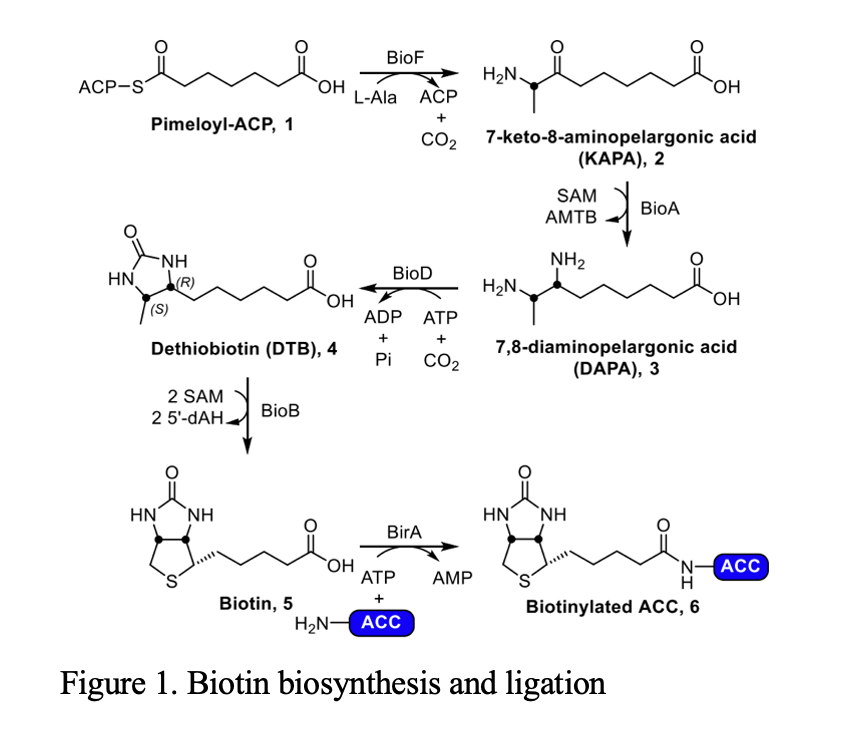
Identifying New Antitubercular Drugs
Inhibition of Siderophore Biosynthesis
Iron acquisition is essential for bacterial pathogenesis. Microorganisms have evolved a variety of mechanisms to obtain this vital nutrient, most commonly by the synthesis, secretion, and reuptake of small molecule iron-chelators termed siderophores.
Inhibition of siderophore biosynthesis represents a logical strategy for the development of a new class of antibiotics and antifungal agents.
Mtb produces the mycobactins, whose biosynthesis is initiated by MbtA.
MbtA catalyzes the incorporation of salicylic acid into mycobactins via an acyl-adenylate intermediate, primed for inhibition by bisubstrate inhibitors.
Our lead compound Sal-AMS was designed to block mycobactin biosynthesis in Mtb at the first committed step, catalyzed by the adenylating enzyme MbtA.
Despite the promising activity of Sal-AMS, it suffers from a number of issues related to its pharmacokinetic (PK) properties, including rapid clearance (Cl = 4.9 mL min-1 kg-1), poor volume of distribution (Vd = 0.08 L kg-1), and little oral bioavailability (F = 1% in rats and mice). Current lab efforts seek to overcome these limitations by removing polar groups from the lead molecule, which serves to decrease topological Polar Surface Area (tPSA) and increase lipophilicity (cLogP), molecular parameters correlated with membrane permeability, clearance and volume of distribution.
Hegde P, Orimoloye MO, Sharma S, Engelhart CA, Schnappinger D, Aldrich CC. Polyfluorinated salicylic acid analogs do not interfere with siderophore biosynthesis. Tuberculosis (Edinb). 2023 [PDF]
Dawadi S, Boshoff HIM, Park SW, Schnappinger D, Aldrich CC. Conformationally Constrained Cinnolinone Nucleoside Analogues as Siderophore Biosynthesis Inhibitors for Tuberculosis. ACS Medical Chemistry Letters. 2018 [PDF]
Design and Synthesis of Inhibitors that Block Biotin Biosynthesis and Ligation
Mycobacterium tuberculosis (Mtb), the principal etiological agent of tuberculosis (TB), infects over one-fourth of humanity and is now the leading cause of infectious disease mortality by a single pathogen. In order to combat this global health threat, new drugs are needed for multidrug resistant (MDR) and extensively drug resistant (XDR) TB. Mtb requires biotin for survival in vivo. In preliminary studies using a genetic approach, we have shown biotin biosynthesis and ligation are essential for Mtb infection in mice. Currently, we are committed to identify and characterized small-molecular inhibitors targeting biotin synthesis and ligation.
Sullivan MR, McGowen K, Liu Q, Akusobi C, Young DC, Mayfield JA, Raman S, Wolf ID, Moody DB, Aldrich CC, Muir A, Rubin EJ. Biotin-dependent cell envelope remodelling is required for Mycobacterium abscessus survival in lung infection. Nature Microbiology. 2023 [PDF]
Bockman MR, Engelhart CA, Cramer JD, Howe MD, Mishra NK, Zimmerman M, Larson P, Alvarez-Cabrera N, Park SW, Boshoff HIM, Bean JM, Young VG Jr, Ferguson DM, Dartois V, Jarrett JT, Schnappinger D, Aldrich CC. Investigation of ( S)-(-)-Acidomycin: A Selective Antimycobacterial Natural Product That Inhibits Biotin Synthase. ACS Infectious Diseases. 2019 [PDF]



